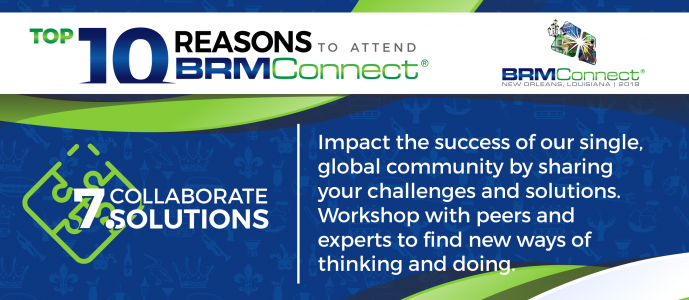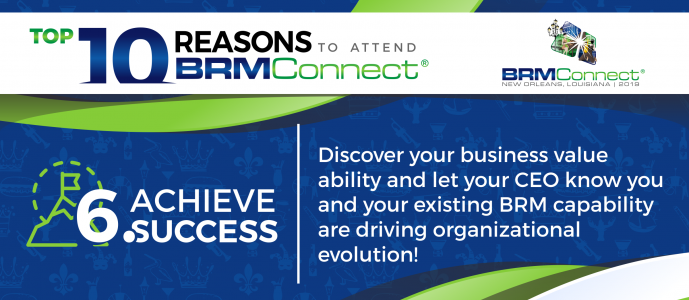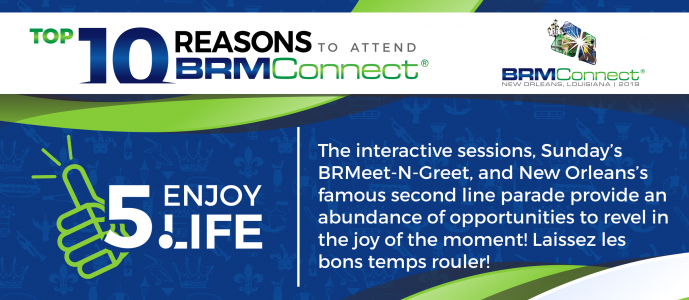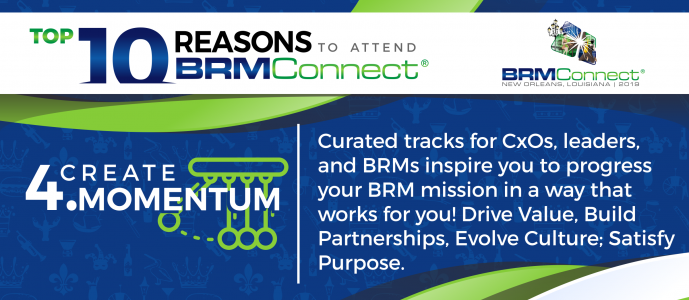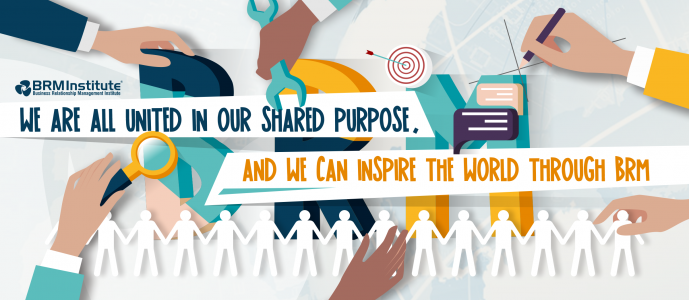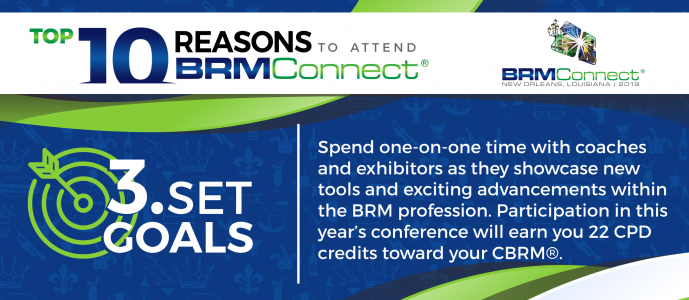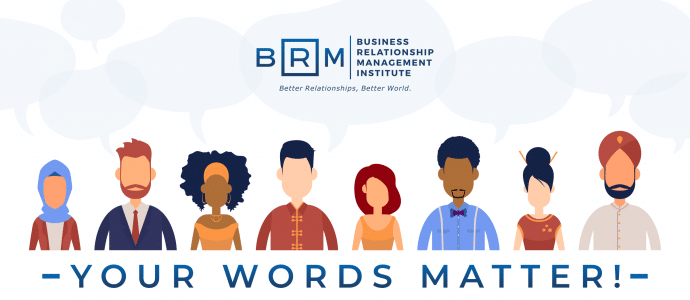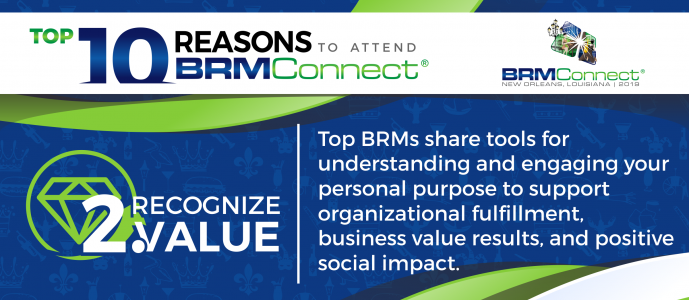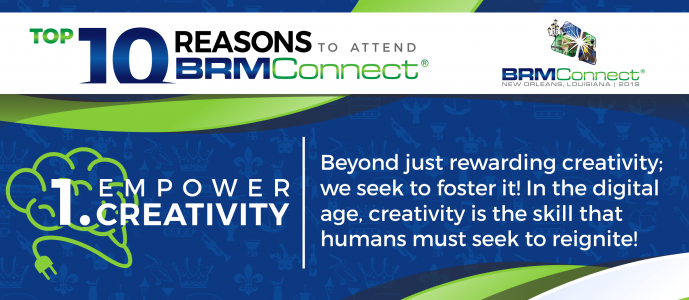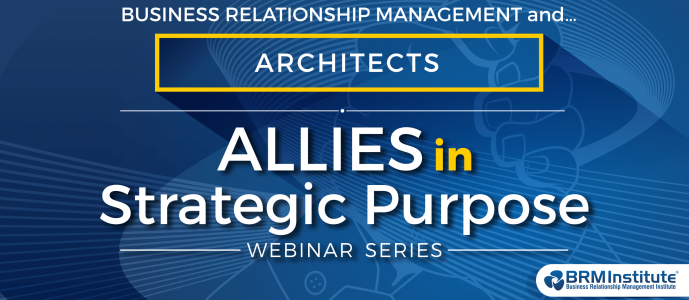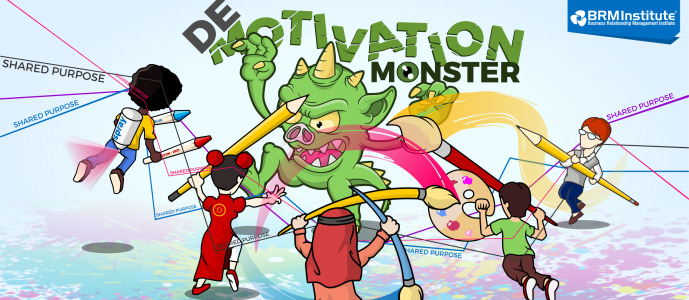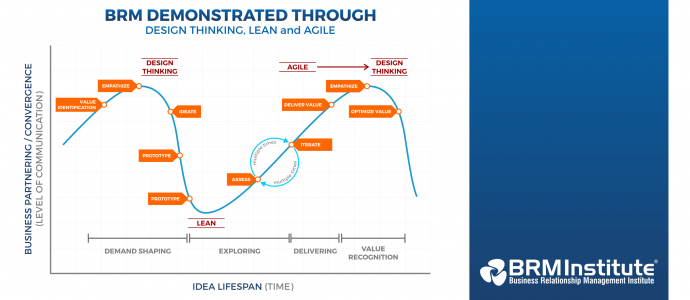BRM Capability
A business relationship management capability is everything it takes, both visible and invisible, to nurture relationships in an organization. Examples of visible components are meetings, artifacts, and professional development, while examples of invisible components are knowledge learned, experience gained, trust, and confidence-building. Used effectively, these components build the endless reserve of energy necessary to evolve culture, build partnerships, drive value, and satisfy purpose.
The business relationship management capability facilitates culture advancement, driving it to one of trust, creativity, innovation, authenticity, and shared ownership across the organization. A mature business relationship management capability converges cross-functional teams to create holistic strategies that deliver organizational value and meaningful results.
Click here to learn more on: BRM Capability Defined | BRM Capability Success
Collaborate Solutions at BRMConnect 2019
“As business leaders, we can navigate away from this egocentric mentality to help build trust amongst our teams by facilitating honest and transparent communication. Moreover, providing time for collaborative teams to get to know each other as individuals will foster the development of trust.”
Meet new people, build new relationships, and workshop with peers and experts to discover new and exciting ways of thinking and doing! We invite you to share your challenges and solutions in an effort to impact the success of our single global BRM community.
Achieve Success at BRMConnect 2019
If you’re looking for the next step in advancing your BRM role or capability, then look to BRMConnect! Attend the conference to discover the true meaning of your business value and learn how to demonstrate this powerful capability and philosophy to your leadership!
BRM & Innovation – How to Get Your Business Partner’s Attention
Learn about how BRM can influence the ability of business units to grow and succeed by bringing them new ideas, insights, and opportunities. Jeff Warren shares his insights on how to gain your business partner’s attention through innovative BRM!
Enjoy Life at BRMConnect 2019
Come enjoy life to the fullest at BRMConnect! See the historical sights of New Orleans and connect with our single global BRM community!
Create Momentum at BRMConnect 2019
Join us at BRMConnect to create momentum that will carry attendees throughout the entire year. Find inspiration and motiviation from other BRMs worldwide!
Inspire the World Together with Shared Ownership
Are you ready to make a difference? As BRMs, we can inspire the world together by driving shared ownership through trust and relationships.
Set Goals at BRMConnect 2019
Partner with us at BRMConnect 2019 and set goals! Spend one-on-one time with coaches and exhibitors showcasing new tools and exciting advancements for BRMs!
The Neuroscience Behind Our Words
Scientific studies show that positive and negative words not only affect us on a deep psychological level, they significantly impact the outcome of our lives.
Recognize Value at BRMConnect 2019
Top BRMs share tools for understanding and engaging your personal purpose to support organizational fulfillment, business value results, and positive social impact.
Focus on Purpose: It Begs the Question, “Why”?
Individual purpose can no longer be neglected by organizations. Learn more about how to discover purpose personally, organizationally, and societally.
Empower Creativity at BRMConnect 2019
Beyond just rewarding creativity; we seek to foster it! In the digital age, creativity is the skill that humans must seek to reignite! – BRMConnect, 2019!
Leveraging Powerful Words to Create Effective Communication
Leverage powerful words to create more effective communication. Additionally, you can apply this when using BRM language with an unfamiliar audience.
Allies in Strategic Purpose: Celebrating Differences and Converging Similarities
BRMs and Business Architects converge powerfully when recognizing how their similarities and complementary skillsets promote shared ownership.
Shared Purpose is more than just a Tiebreaker
Shared purpose. It’s here and evolving organizational culture across the globe. Organizations recognize that profit alone will not drive tomorrow’s world.
Creativity is the Power Skill that Drives Organizational Value
Creativity is now a must-have asset for every growing enterprise. And yet, most businesses are falling short in their creative capacities. Rather than searching for external creative experts, organizations can evolve their culture to unlock the creative potential inside every employee.
How Your Purpose Shapes the Value of Your Work
Most of us strive to live a life of purpose. But within the day-to-day hustle of life, it’s all too easy to lose sight of what truly drives us. This can, in turn, affect not just our relationships and our lifestyles, but also our professional lives.
Combine Your Business Methodologies for a Targeted Growth Strategy
By converging the methodologies of Design Thinking, Lean, and Agile with the BRM Core Disciplines, your business development will establish a solid foundation to grow your organization and role in a manageable way.
Emotional Intelligence – Elevation Through Practice
What can you achieve when you facilitate truly meaningful connections? Emotional Intelligence (EI) may be the key to cultivating better relationships with ourselves and with those around us. Learn how to cultivate the different components of EI to tap into your relationship potential.
